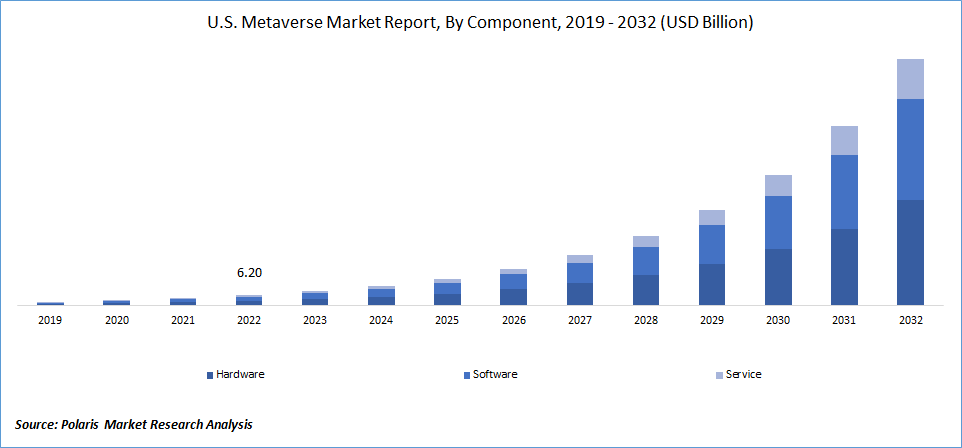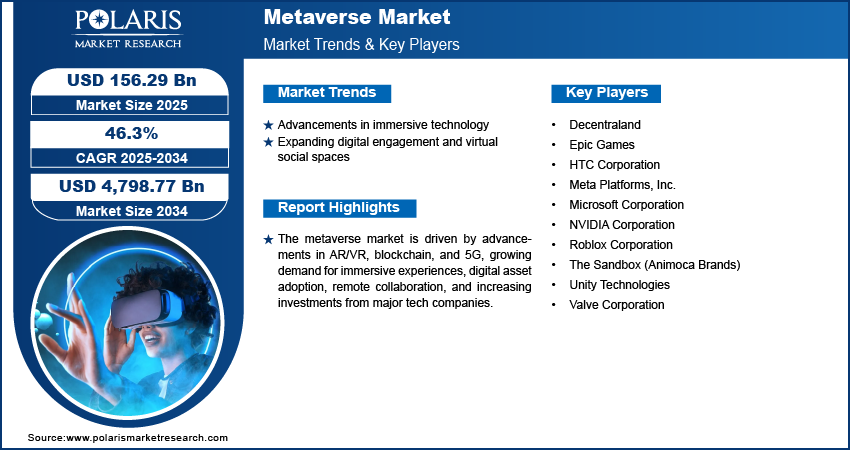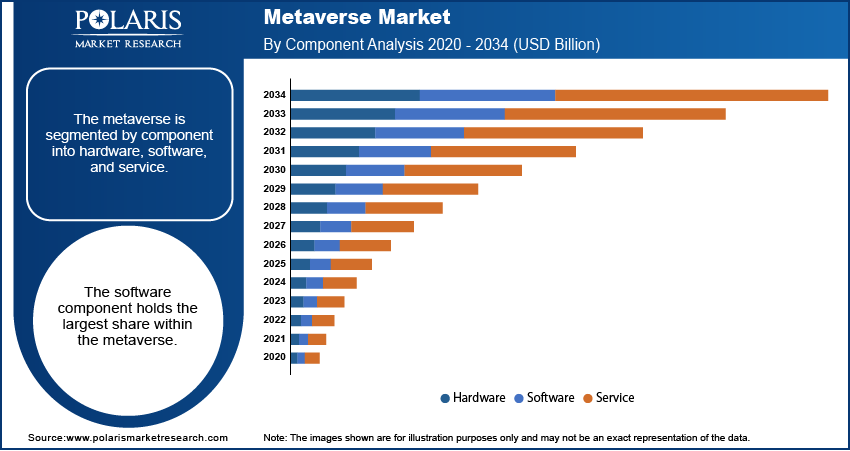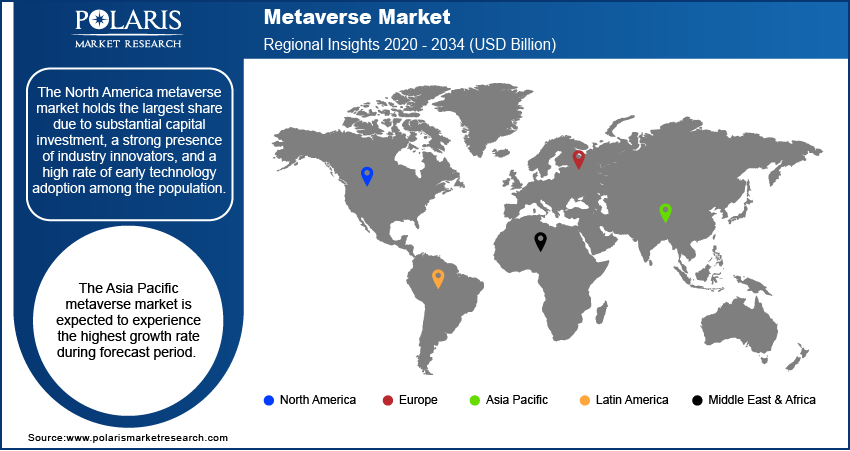
Metaverse Market Size, Share, Trends, Industry Analysis Report
By Component (Hardware, Software, Service), By Technology (Blockchain, Virtual Reality & Augmented Reality), By Application, By Industry, By Region – Market Forecast, 2025–2034
- Published Date:Oct-2025
- Pages: 129
- Format: PDF
- Report ID: PM2661
- Base Year: 2024
- Historical Data: 2020-2023
Market Overview
The metaverse market size was valued at USD 107.01 billion in 2024 and is expected to register a CAGR of 46.3% from 2025 to 2034. Advancements in AR/VR, blockchain, and 5G boost the industry growth. Also, growing demand for immersive experiences, digital asset adoption, and remote collaboration propels the market expansion.
Key Insights
- In 2024, the software segment held the largest share. The expansive and growing ecosystem of virtual experiences and functionalities solidifies software's position as a leader in size and engagement.
- The virtual reality (VR) and augmented reality (AR) segment held the largest share in 2024. AR and VR technologies serve as the primary interface through which users engage with immersive digital worlds, which significantly influences the adoption of the metaverse.
- The gaming segment accounted for the largest share of metaverse applications in 2024. High user engagement, combined with established monetization strategies in gaming, positions this sector to capture a significant portion of the market.
- The media and entertainment segment held the largest share in 2024. The gaming ecosystem, which includes virtual concerts, social experiences, and content consumption, is consistently active and demands new, captivating systems. This, in turn, fuels further advancements in metaverse platforms.
- North America held the largest share in 2024, due to substantial capital investment, a strong presence of industry innovators, and a high rate of early technology adoption among the population.
- The Asia Pacific metaverse industry is expected to experience the highest growth rate during the forecast period. Investments in developed metaverse localized frameworks, along with rural infrastructure development, are facilitating technological advancements in digitalized regions across multiple domains. This offers promising opportunities for future expansion.
Industry Dynamics
- Advancements in immersive technologies, such as virtual reality (VR), augmented reality (AR), mixed reality (MR), and extended reality (XR), drive the growth of the metaverse market.
- The increasing trend of individuals spending more time in digital environments, particularly in online gaming and social platforms, fuels the growth of the industry.
- The expansion of the metaverse industry is significantly driven by the development of digital economies and asset ownership.
- Increasing investments from major tech companies in developing the metaverse are expected to provide opportunities during the forecast period.
- High costs of hardware and infrastructure hinder the industry expansion.
Market Statistics
2024 Market Size: USD 107.01 billion
2034 Projected Market Size: USD 4,798.77 billion
CAGR (2025–2034): 46.3%
North America: Largest market in 2024
AI Impact on Metaverse Market
- Adaptive environments utilize machine learning (ML) to respond in real-time to user actions. It creates dynamic and personalized user experiences.
- AI avatars are becoming lifelike. They adapt to user behavior and preferences. The avatars enhance social interaction, as well as emotional engagement within virtual spaces.
- Predictive analytics enables platforms to predict user needs as it customizes content and interactions to enhance retention and satisfaction.
- Generative AI (GenAI) streamlines content creation, enabling rapid development of virtual narratives, assets, and environments.
- The AI technology helps enhance security and moderation by detecting harmful behavior in complex digital ecosystems.

To Understand More About this Research: Request a Free Sample Report
The metaverse is an evolving digital landscape that functions as a persistent, interactive virtual universe where users, represented by avatars, can socialize, work, play games, and shop. This environment merges physical and digital realities, creating experiences that extend beyond traditional internet interactions. The development of this ecosystem relies on advanced technologies such as virtual reality (VR), augmented reality (AR), artificial intelligence (AI), and blockchain, which are used to create complex, three-dimensional digital spaces. The metaverse represents an advanced form of the internet, aiming to enhance interconnectivity and user presence, which may ultimately change how individuals and businesses operate globally.
Continuous improvements to hardware and the increasing availability and capabilities of VR and AR devices are key factors driving the metaverse in healthcare growth. Simultaneously, there is a strong demand for immersive entertainment, remote collaboration, and new trends in social interactions, which are further propelling the adoption of this technology. Additionally, the significant investments from major tech companies in VR, along with the incorporation of decentralized systems like blockchain for secure transactions and the management of digital assets, are transformative drives the market revenue.
Industry Dynamics
Advancements in immersive technology
Advancements in immersive technology are crucial to the growth of the metaverse market. Technologies such as virtual reality (VR), augmented reality (AR), mixed reality (MR), and extended reality (XR) are creating engaging and interactive digital environments that replicate real-world experiences. These technologies enable users to socialize, work, learn, and play in fully immersive 3D spaces, significantly enhancing the overall user experience.
High-definition visuals, spatial audio, haptic feedback, and motion tracking contribute to a greater sense of presence and realism, making the metaverse more appealing to both consumers and businesses. Improvements in hardware—like lightweight headsets, smart glasses, and advanced sensors—have lowered entry barriers and increased accessibility. Additionally, software advancements, including AI-driven avatars, real-time rendering engines, and cloud computing, are facilitating the creation of more complex and responsive virtual worlds.
As a result, industries such as gaming, entertainment, education, healthcare, and retail are increasingly adopting immersive technologies to develop metaverse applications that enhance engagement and drive innovation. These developments not only improve user satisfaction but also create new revenue streams through virtual goods, services, and experiences. Overall, the evolution of immersive technology is a key driver in transforming the metaverse from a conceptual vision into a scalable and monetizable digital ecosystem.
Expanding digital engagement and virtual social spaces
The increasing trend of individuals spending more time in digital environments, particularly in online gaming and social platforms, lays a strong foundation for the growth of the metaverse and the industrial metaverse. Users are becoming more accustomed to forming communities and interacting in virtual settings, which naturally paves the way for more complex and immersive metaverse experiences. A research paper published in JMIR Serious Games in 2023 examined the use of serious games for health education and found high levels of user engagement and satisfaction. This demonstrates a societal comfort and preference for interactive digital platforms. This established comfort and demand for rich online interaction significantly contribute to the expansion of the metaverse.
Development of digital economies and asset ownership
The growth of the metaverse market is significantly driven by the development of digital economies and asset ownership. In virtual worlds, users can create, trade, and own digital assets such as virtual land, avatars, clothing, and art. This process is often facilitated by blockchain technology and non-fungible tokens (NFTs). These digital assets give users a sense of ownership and control, reflecting real-world economic systems within digital environments.
Blockchain technology ensures transparency, security, and verifiability of transactions, enabling the creation of decentralized marketplaces where users can exchange goods and services freely. This development has led to the rise of virtual businesses, play-to-earn gaming models, and innovative investment opportunities, where real monetary value is linked to virtual activities. Additionally, digital currencies, including cryptocurrencies, are increasingly being integrated into metaverse platforms, allowing for seamless and borderless transactions.
The ability to monetize time, creativity, and social influence in these virtual spaces is attracting more users and developers, thus expanding the ecosystem. As digital economies mature, they are drawing significant interest from brands, creators, and entrepreneurs who see the metaverse as a new frontier for commerce and community building. This evolution not only enhances user engagement but also establishes the metaverse as a viable and sustainable economic platform.

Segmental Insights
Market Assessment By Component
In 2024, the software component helds the largest share in the metaverse. This expansive and continually growing ecosystem of virtual experiences and functionalities solidifies software's position as a leader in both size and engagement, significantly contributing to advancements in the digital realm.
The service component of the metaverse is expected to grow significantly during forecast period. This category includes professional services such as building virtual worlds and digital assets, content maintenance and administration, experience design and consulting, as well as other platform support and maintenance services. As the metaverse expands and becomes more integrated into various aspects of daily life, the demand for specialized skills needed to create, populate, and manage complex virtual environments is increasing. The intricacy involved in designing engaging and scalable metaverse experiences makes a strong case for substantial investment in service infrastructure to support the rapid growth achievable through increased adoption.
Market Evaluation By Technology
The virtual reality (VR) and augmented reality (AR) subsegment holds the largest share in the metaverse market. These technologies serve as the primary interface through which users engage with immersive digital worlds, which significantly influences the adoption of the metaverse. The significant advancements and growing popularity of VR headsets and AR applications across various sectors, such as gaming, education, and enterprise, have made a substantial impact. Continued investments in these areas, along with ongoing innovations in software and hardware, play a crucial role in shaping the size and growth of the VR and AR markets, highlighting their essential role in enhancing interactivity within the metaverse.
Blockchain technology is expected to grow at the fastest rate within the metaverse. This technology represents a significant opportunity for growth due to the decentralization of ownership of digital assets through non-fungible tokens (NFTs), transparent transactions, and secure virtual economies. As the metaverse continues to develop, the demand for verifiable ownership, cross-platform signatures, and advanced security measures is driving the adoption of blockchain technologies. This evolution is creating the dynamics of a truly user-driven and decentralized virtual universe with immense potential, marking a transformative shift in the landscape of the metaverse.
Market Evaluation By Application
Gaming accounts for the largest share of metaverse applications, largely due to the rising presence of virtual worlds and experiences within the gaming industry. This ongoing popularity significantly drives the development of the metaverse. High user engagement, combined with established monetization strategies in gaming, positions this sector to capture a significant portion of the market. As a result, gaming remains a key demand trend, fostering strong engagement and spurring innovation throughout the broader metaverse.
Social media and content creation are poised for the highest growth potential among metaverse applications. As the digital landscape evolves, people increasingly seek to express themselves and connect with others. This trend drives demand for user-generated content and social experiences. The emphasis on community-building and participatory culture fuels the metaverse's potential, which is crucial for its long-term sustainability. There is considerable progress in this area, particularly with the shift toward user-centered connection paradigms.
Market Evaluation By Industry
The media and entertainment segment holds the largest share during forecast period. This sector has emerged as a key driver and adopter of immersive technology, along with its user base. The gaming ecosystem, which includes virtual concerts, social experiences, and content consumption, is consistently active and demands new, captivating systems. This, in turn, fuels further advancements in metaverse platforms. The demand and inherent innovation provided by media and entertainment significantly influence the size and dynamics of the metaverse.
The retail segment is experiencing the fastest growth within the market. As companies explore new forms of customer interaction and metaverse e-commerce, virtual stores, digital showrooms, and other shopping interfaces present immense untapped value. The increasing adoption of virtual fitting rooms, NFT-branded digital items, and shopping experiences integrated into virtual worlds further adds to these emerging factors. This evolving landscape offers retailers powerful new avenues to access and engage consumers globally while impacting brand perceptions, ultimately shaping the future of the metaverse.

Regional Analysis
The North America metaverse market holds the largest share due to substantial capital investment, a strong presence of industry innovators, and a high rate of early technology adoption among the population. Key players in augmented and virtual reality technology, along with other metaverse companies in the region, focus on extensive research and development initiatives. The ecosystem of avid consumer tech enthusiasts, combined with the efforts of large tech corporations, gives North America significant attention in the global metaverse market.
The Asia Pacific metaverse market is expected to experience the highest growth rate during forecast period. Traditional online gaming and digital entertainment, along with online shopping and various lifestyle elements in the region, are primarily driven by increased consumer spending. Additionally, investments in developed metaverse localized frameworks, along with rural infrastructure development, are facilitating technological advancements in digitalized regions across multiple domains. This makes Asia Pacific the most lucrative region for IT infrastructure development, offering promising opportunities for future expansion.

Key Players and Competitive Insights
Major players actively shaping the metaverse market include Meta Platforms, Inc., Roblox Corporation, Epic Games, Microsoft Corporation, NVIDIA Corporation, Decentraland, The Sandbox (Animoca Brands), Unity Technologies, Valve Corporation, and HTC Corporation. These organisations are diverse, spanning from social media giants pivoting to immersive experiences to gaming powerhouses, hardware manufacturers, and developers of foundational digital infrastructure. Each company contributes unique elements, from virtual reality headsets and graphical processing units to decentralised virtual land and content creation tools, highlighting a broad investment across the technological stack required for metaverse development and penetration.
The competitive landscape of the metaverse is fragmented across various global sectors, including platform development, content creation, and technological innovation. Enterprises are vying to create engaging virtual worlds and interoperable systems that promote rich digital economies and facilitate high levels of user interaction. The dynamics of competition also involve consortium formations, strategic alliances, and mergers and acquisitions, excluding the companies that have been acquired. Companies are investing significantly in research and development to overcome barriers to user immersion. Their goal is to provide users and creators with the essential tools to integrate their lifestyles into the metaverse while addressing challenges related to scalability, interoperability, and safety.
List of Key Companies
- Decentraland
- Epic Games
- HTC Corporation
- Meta Platforms, Inc.
- Microsoft Corporation
- NVIDIA Corporation
- Roblox Corporation
- The Sandbox (Animoca Brands)
- Unity Technologies
- Valve Corporation
Metaverse Industry Developments
- May 2025: Roblox introduced new commerce APIs that allow brands and creators to integrate physical goods for purchase directly within virtual stores on its platform.
- March 2025: NVIDIA announced that its Omniverse platform, designed for industrial digital twins and physical AI development, is expanding across more industries and partners. New Omniverse Blueprints are enabling robot-ready facilities and large-scale synthetic data generation.
Metaverse Market Segmentation
By Component Outlook (Revenue – USD Billion, 2020–2034)
- Hardware
- Software
- Service
By Technology Outlook (Revenue – USD Billion, 2020–2034)
- Blockchain
- Virtual Reality & Augmented Reality
- Mixed Reality
- Others
By Application Outlook (Revenue – USD Billion, 2020–2034)
- Digital Marketing
- Content Creation & Social Media
- Gaming
- Events & Conference
- Online Shopping
- Testing & Inspection
- Others
By Industry Outlook (Revenue – USD Billion, 2020–2034)
- Retail
- Media & Entertainment
- BFSI
- Others
By Regional Outlook (Revenue-USD Billion, 2020–2034)
- North America
- US
- Canada
- Mexico
- Europe
- Germany
- France
- UK
- Italy
- Spain
- Netherlands
- Russia
- Rest of Europe
- Asia Pacific
- China
- Japan
- India
- Malaysia
- South Korea
- Indonesia
- Australia
- Vietnam
- Rest of Asia Pacific
- Middle East & Africa
- Saudi Arabia
- UAE
- Israel
- South Africa
- Rest of Middle East & Africa
- Latin America
- Brazil
- Argentina
- Rest of Latin America
Metaverse Market Report Scope:
|
Report Attributes |
Details |
|
Market Size Value in 2024 |
USD 107.01 billion |
|
Market Size Value in 2025 |
USD 156.29 billion |
|
Revenue Forecast by 2034 |
USD 4,798.77 billion |
|
CAGR |
46.3% from 2025 to 2034 |
|
Base Year |
2024 |
|
Historical Data |
2020–2023 |
|
Forecast Period |
2025–2034 |
|
Quantitative Units |
Revenue in USD billion and CAGR from 2025 to 2034 |
|
Report Coverage |
Revenue Forecast, Market Competitive Landscape, Growth Factors, and Industry Insights |
|
Segments Covered |
|
|
Regional Scope |
|
|
Competitive Landscape |
|
|
Report Format |
|
|
Customisation |
Report customisation as per your requirements with respect to countries, regions, and segmentation. |
FAQ's
The global market size was valued at USD 107.01 billion in 2024 and is projected to grow to USD 4,798.77 billion by 2034.
The market is projected to register a CAGR of 46.3% during the forecast period, 2024-2034.
North America had the largest share of the market.
Major players include Meta Platforms, Inc., Roblox Corporation, Epic Games, Microsoft Corporation, NVIDIA Corporation, Decentraland, The Sandbox (Animoca Brands), Unity Technologies, Valve Corporation, and HTC Corporation.
The software segment accounted for the largest share of the market in 2024.
The following are some of the market trends: ? Creation of Seamless Experiences and Cross-Platform Compatibility: More and more industries are trying to promote greater penetration into services and user freedom by developing interoperable systems that allow for the movement of digital assets and avatars across various virtual worlds. ? Artificial Intelligence and Machine Learning Integration: Artificial Intelligence is one of the biggest drivers that augment the virtual world with intelligent NPCs (non-player characters), sophisticated avatars to interact with, custom content, and user-specific interactions, greatly impacting development.
The metaverse is a new stage of the internet being developed as an immersive, integrated set of 3D virtual worlds that encompass an interlinked ecosystem. Users are represented as avatars and can participate in real-time interactions with one another, with digital objects and AI agents. This erodes the distinction between physical reality and digital versions. The new space combines multiple technologies, including Virtual Reality, Augmented Reality, Blockchain, and Artificial Intelligence, seeking to establish advanced simulated environments to socialise, play games, conduct business, learn, or work remotely.
